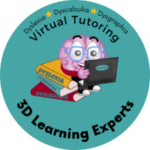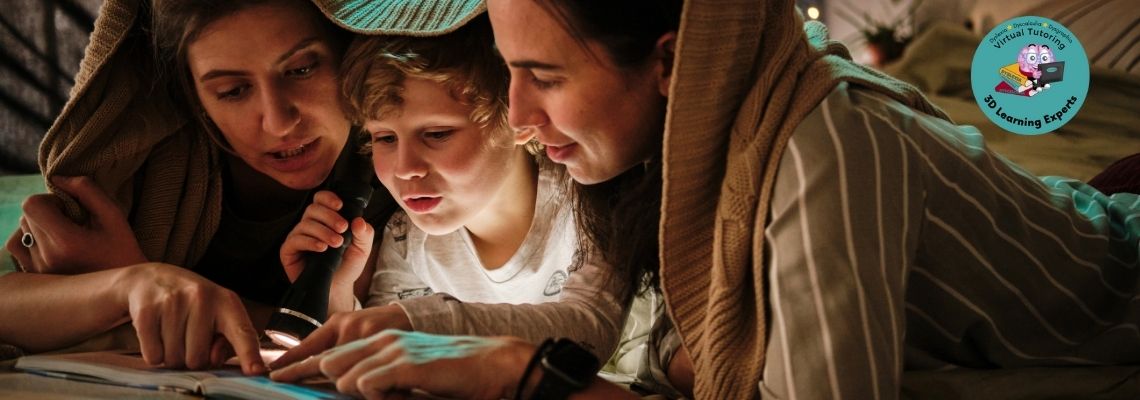If your child is bright, curious, and full of potential but still struggles with reading, spelling, or writing, you may wonder if something more is happening. You’ve heard of Dyslexia, but aren’t sure how to tell if your child needs help, or what kind of support will truly make a difference.
At 3D Learning Experts, we specialize in tutoring children with Dyslexia, Dysgraphia, and Dyscalculia, using proven methods like Orton-Gillingham to unlock learning in a way that works for them.
We’ll walk you through five common signs your child may benefit from working with a Dyslexia tutor, plus what to do next if any of these sound familiar.
1. Your Child Struggles With Reading—Even After Plenty of Practice
Reading doesn’t come naturally to all children, but when a child consistently struggles with sounding out words, blending letters, or recognizing sight words—despite repeated exposure—it could be a red flag.
Children with Dyslexia may:
- Avoid reading altogether or say they “hate reading”
- Guess at words instead of decoding them
- Read slowly or with poor accuracy
- Have difficulty rhyming or hearing word parts
A specialized tutor may be the missing piece if you’ve tried extra reading at home or summer programs and still see limited progress.
2. Spelling Is Inconsistent or Seemingly Random
Dyslexia affects both reading and spelling. If your child writes the same word multiple ways in the same paragraph (like “frend,” “frend,” “friend”), that’s a key indicator.
Look for:
- Reversals of letters like b/d or p/q
- Spelling phonetically (e.g., “sed” for “said”)
- Omitting vowels or key sounds
- Trouble remembering spelling rules, even after they’re taught
A specialized tutor will use a structured, sequential approach to spelling that helps make sense of the English language in a logical, brain-friendly way.
3. They Excel in Some Areas, But Language-Based Tasks Are a Struggle
Many children with Dyslexia are creative, verbal, and intelligent—but there’s a noticeable gap between their ideas and their ability to read or write them.
This might look like:
- Strong storytelling skills but weak writing mechanics
- High comprehension when listening, but trouble reading the same material
- Great in math or science, but reading and writing drag down grades
This disconnect can be frustrating for both parent and child. With the right support, kids with Dyslexia can learn to succeed across subjects, without their language difficulties holding them back.
4. Homework Is a Daily Battle (Especially Anything with Reading or Writing)
If your child melts down at the sight of a reading assignment or takes hours to complete simple homework, it may not be about motivation or attitude. It may be because the work feels overwhelming or even impossible.
Children with undiagnosed Dyslexia often:
- Get anxious or emotional before school or homework
- Complain of stomachaches or headaches before reading tasks
- Act out or withdraw when it’s time to read aloud
- Struggle with attention, especially when decoding is involved
Working with a trained tutor who understands their brain can ease that stress and help rebuild their confidence.
5. You’ve Got a Gut Feeling Something Isn’t Right
You’ve read books. Asked teachers. Tried extra help. But something still feels off.
Trust your intuition. Many parents of children with Dyslexia say they knew something was different long before they had a formal diagnosis. If you’ve ruled out lack of practice, behavioral issues, or general immaturity, and your child is still struggling, an evaluation or consultation with a Dyslexia specialist may be the next best step.
What a Dyslexia Tutor Can Do That a Regular Tutor May Not
A specialized Dyslexia tutor (like those at 3D Learning Experts) will:
- Use a structured literacy approach such as Orton-Gillingham
- Address reading, spelling, and writing at the foundational level
- Provide multisensory instruction to engage different learning pathways
- Move at a pace tailored to your child’s mastery, not a curriculum timeline
- Understand the emotional side of learning struggles and help rebuild confidence
Quick Checklist: Should I Consider a Dyslexia Tutor?
- My child reads below grade level, despite lots of practice
- Spelling is inconsistent or difficult
- Reading or writing assignments cause anxiety or tears
- My child has strengths, but reading or writing holds them back
- I feel like something is wrong, but I don’t know what
If you checked two or more, it’s time to explore your options.
Frequently Asked Questions
Does my child need a diagnosis before starting tutoring?
No. We support students with or without a formal diagnosis. If Dyslexia is suspected, we can still begin working on foundational skills right away.
Is online tutoring effective for Dyslexia?
Absolutely. Our trained tutors use engaging, multisensory tools tailored for virtual instruction. Many of our students make faster progress online because they feel more comfortable in their own home.
Ready to Get Your Child the Help They Deserve?
We know how hard it is to watch your child struggle—and how confusing it can be to find the right support. That’s why 3D Learning Experts offers one-on-one online tutoring with highly trained specialists who understand how your child’s brain works.
Book a free consultation today to see how a specialized Dyslexia tutor can help your child finally thrive.

